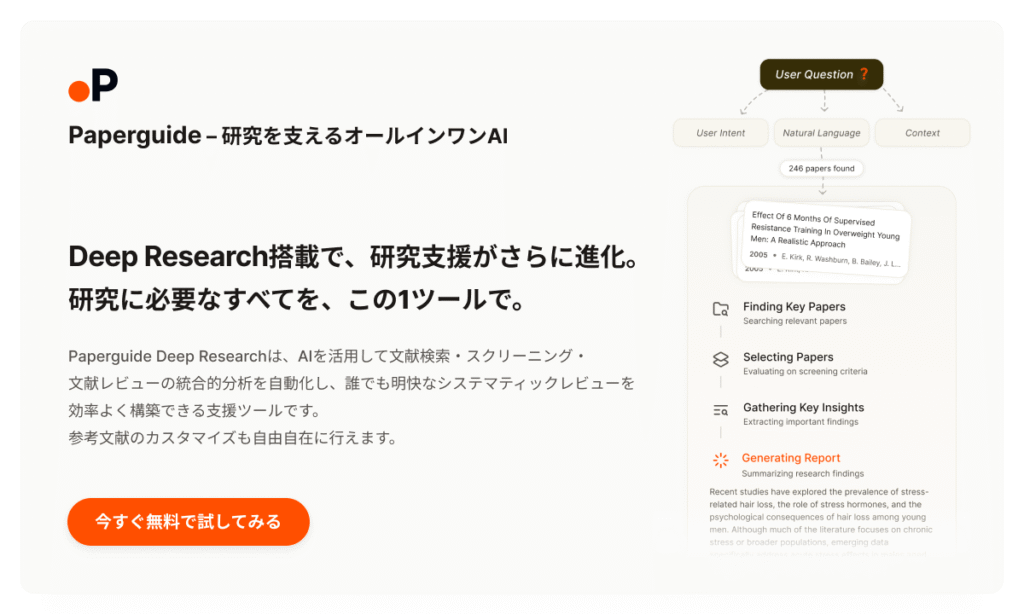What kind of person is a "post-doctoral researcher" in a university laboratory?

I hear that after you get your doctorate, you often become a "post-doctoral fellow".
I'm not sure what kind of working style and income I'll get...
Postdoctoral fellow stands for "postdoctoral fellow," a person who, after receiving a Ph.Non-regular.A working researcher.
Currently in academia, competition for university faculty positions is intensifying, and many researchers work temporarily as non-regularly employed post-doctoral fellows (researchers).
This article will provide a detailed overview of post-doctoral positions in terms of 'characteristics, working style, attributes, tenure, income, problems, and advantages.
The main data presented areAnalysis of research activities and living conditions of postdoctoral fellows and others (2018)based on the latest data available at this time (as of October 2023).
What is a postdoctoral fellow?
First, the definition of a postdoctoral fellow is "a person who, after obtaining a Ph.Fixed-term positionsThe "researcher" is "a researcher who is not a university faculty member or principal investigator in a post of a university faculty member or principal investigator.

A more specific definition of a postdoctoral fellow is one that meets the following four requirements
- Doctoral degree holders or students who have completed their doctoral studies
- At universities and other research institutions,with a fixed term of office(This includes those who receive payment in the form of honorarium, those who are dispatched by a staffing agency, and those who continue their research activities without receiving a salary or other benefits.)
- Those who do not hold a post as a professor, associate professor, lecturer, assistant professor, etc.
- Those who do not hold a post as a research group leader, principal investigator, etc.
If university faculty members are "full-time employees," post-doctoral fellows can almost certainly be thought of as "part-time employees.
Postdocs have a variety of official employment titles
From a survey conducted by the Ministry of Education, Culture, Sports, Science and Technology (MEXT), researchers working as post-doctoral fellows were asked to answer "official job title" at their institutions in an open-ended format,More than 100 different job titles responded to 1035 respondents.The company has been
Examples of official job titles for postdoctoral positions
- research fellow
- researcher
- postdoctoral fellow
- Researcher for Industry-Academia-Government Collaboration
- Specially Appointed Researchers
- Part-time researcher, etc.
 Akanon
AkanonThere are so many different ways to call it, depending on the institution.
How to become a postdoctoral fellow
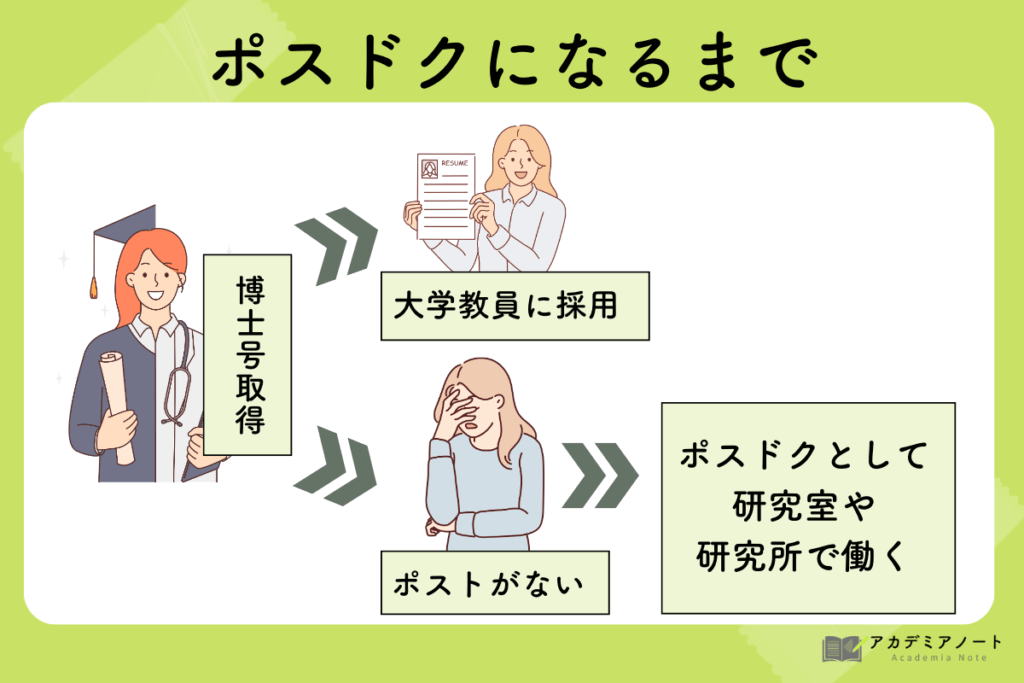
Since only a limited number of people can become university faculty immediately after obtaining a doctorate, researchers who did not have a post become post-doctoral fellows.
In exceptional cases, in the final year of the Ph.JSPS Research Fellow PDIn many cases, if you are selected for a fellowship such as the following, you will work as a post-doctoral fellow without seeking employment.
Postdoctoral fellowship can be considered a "training period".
In a nutshell, a postdoctoral fellow's position can be summarized as "a period of preparation for a higher position in academia or industry while accumulating research achievements.
 Akanon
AkanonPostdocs areEveryone goes through this as a training period for researchers.It is being positioned as a
Characteristics of Postdoctoral Fellows
There are four characteristics of the post-doctoral working style
- Term of office.
- Work under a Principal Investigator (PI)
- Salaries are financed by various sources
- Compared to the same age in other jobsmeager salary
Characteristics of Postdoctoral Fellows (1): Term of Office
The post-doctoral tenure is primarilyTerm of office from 1 to 5 years。
Depending on the results and the progress of the project, the contract may be renewed to work for more than the number of years of the contract at the time of employment.
If the source of funding for employment is the laboratory's basic research fund, they may work for a long period of time with repeatedly renewed contracts.
The term of office will be discussed in more detail below. →.Term of Postdoctoral Fellowship
Characteristics of Postdoctoral Fellows (2): Working under a Principal Investigator (PI)
Postdoctoral fellows do not have their own laboratories, but work for their employer, the principal investigator (PI).
Therefore, there are many different cases of working styles, as shown in the examples below.
- Example: Working onThe study is determined
- E.g., within a defined field, relativelyFree postdoctoral fellow's own researchcan (do)
- Example:Assistance in university educationMany jobs in the
Characteristics of Postdoctoral Fellows (3): Salaries are financed by various sources.
Postdoctoral fellows may be employed by laboratories, universities, etc., or they may earn their own salaries from external funds.
- Research funds provided by the University (basic expenses(etc.) to pay post-doctoral salaries from
- Research funds obtained externally by the Principal Investigator (PI) (competitive grant(etc.) to pay post-doctoral salaries from
- Postdocs themselves earn their own salaries from outside sources (fellowship)
The details are described below.Post-doctoral employment fundingへ
Characteristics of postdoctoral fellows (4): Thin salary compared to their peers in other jobs
It varies depending on the conditions of employment,3-6 million per year for post-doctoral fellowsIt is.
They may work full time full-time or part-time, such as two or three days a week.
Considering that Ph.D. graduates are at the earliest just before the age of 30, the salary is thin compared to their peers.
Details of salaries, including by field, are described below →.Annual income of postdoctoral fellowsへ
Number of postdoctoral fellows
At the beginning, how many postdocs are there? From the point of view of the number of postdocs, there were 15590 as of 2018.
It is estimated that there are still approximately 15,000 people in the area.
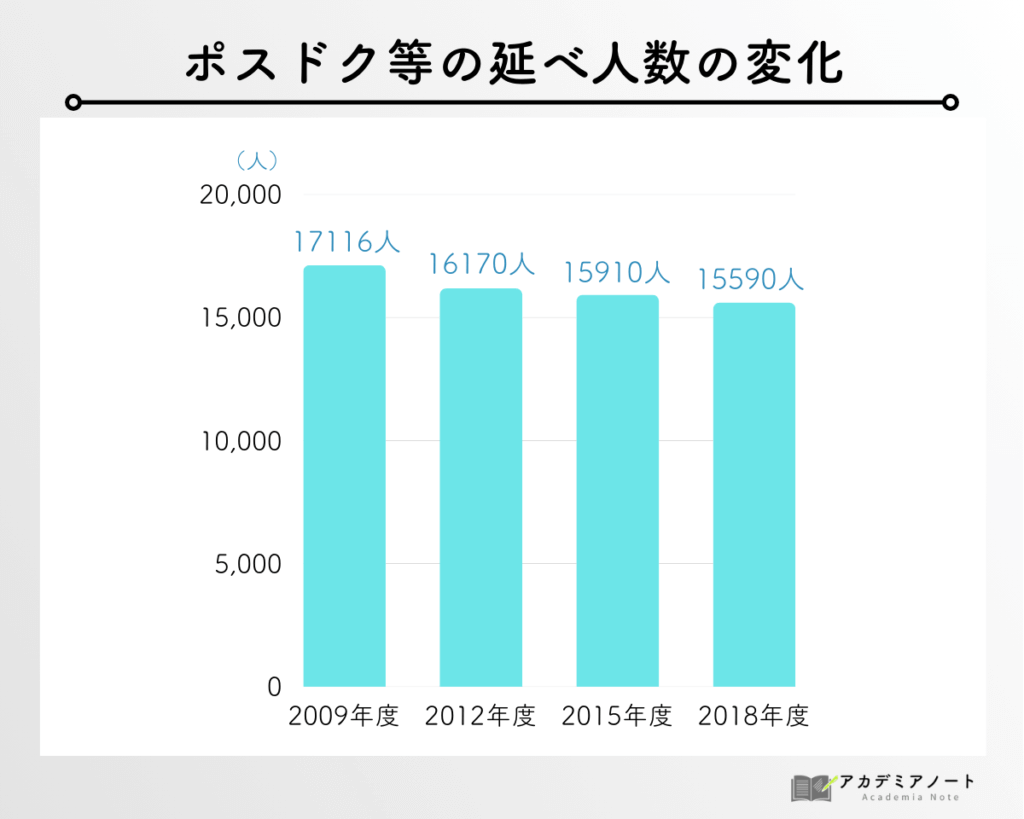
 Akanon
AkanonAs of 2021, the total number of researchers in academia was 336,800, according to the survey results, which means that about one out of every 23 researchers in academia is a postdoctoral fellow.
Gender and age of postdocs
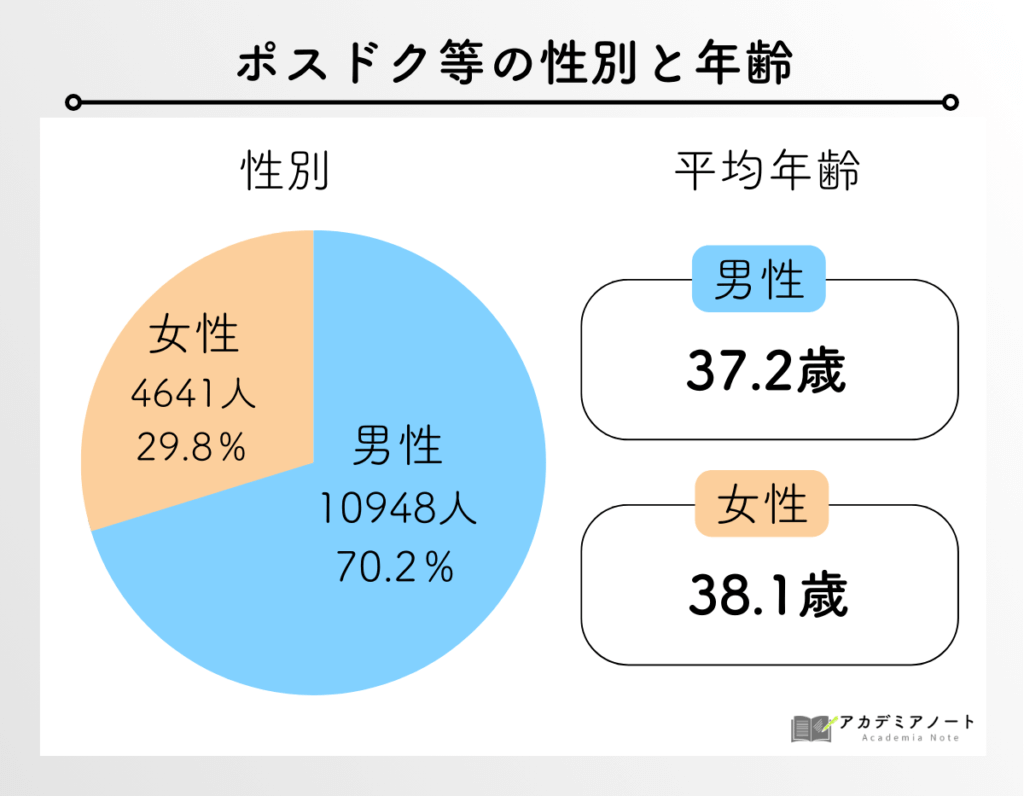

I'm concerned about the older age.
 Akanon
AkanonActually, it's older than the same survey conducted in 2014.
One possible reason for this is that the simultaneous mid-career post-doctoral fellows who did not age into the trend of hiring younger university faculty members are still post-doctoral fellows.
Where Postdocs Work
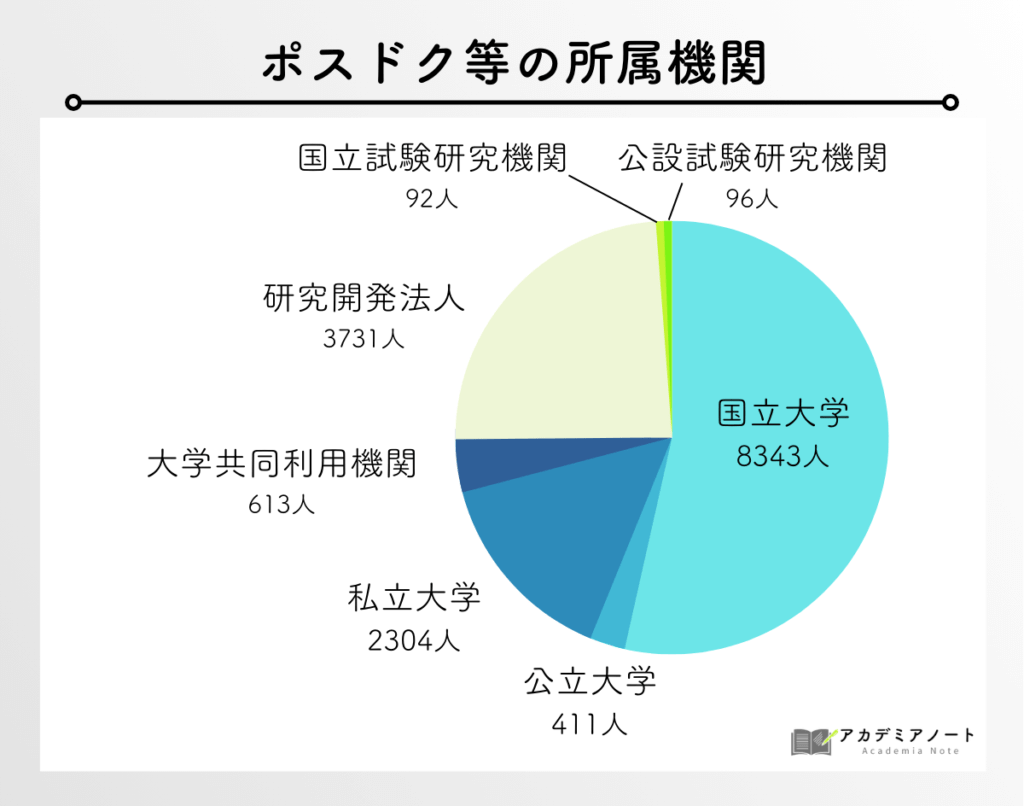
 Akanon
Akanon74.9% in universities
Postdoctoral Fields
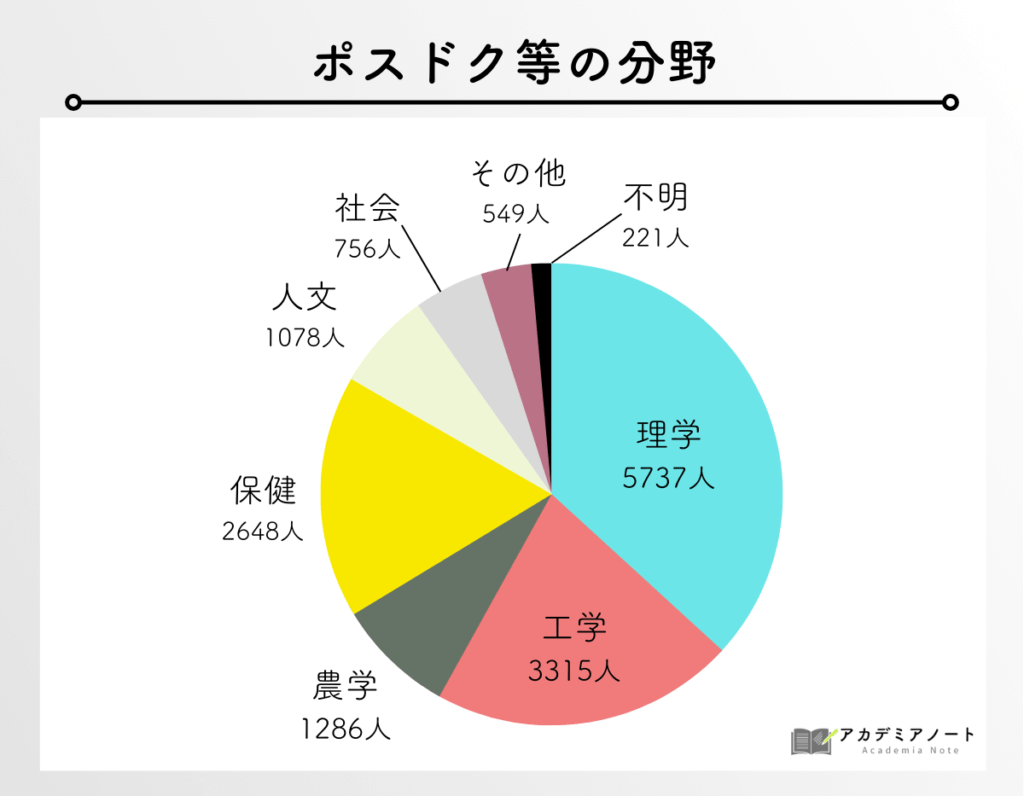
 Akanon
AkanonThere are a lot of sciences.
Term of Postdoctoral Fellowship
Looking at the term of office at the time of post-doctoral contracts, the majority of these contracts are for one year or less.
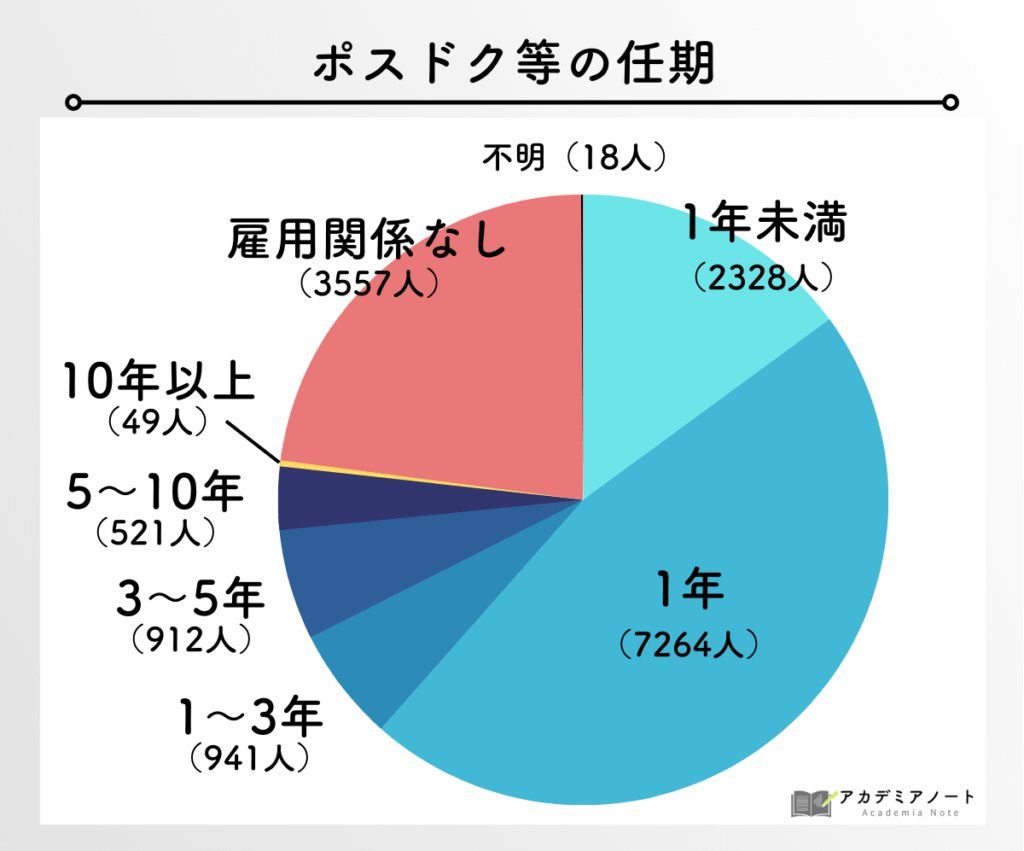

Eh, shorter than I thought...
 Akanon
AkanonIt looks short, but it is actually'Repeatedly re-signed for shorter terms.'In many cases, I've been working for a long time.
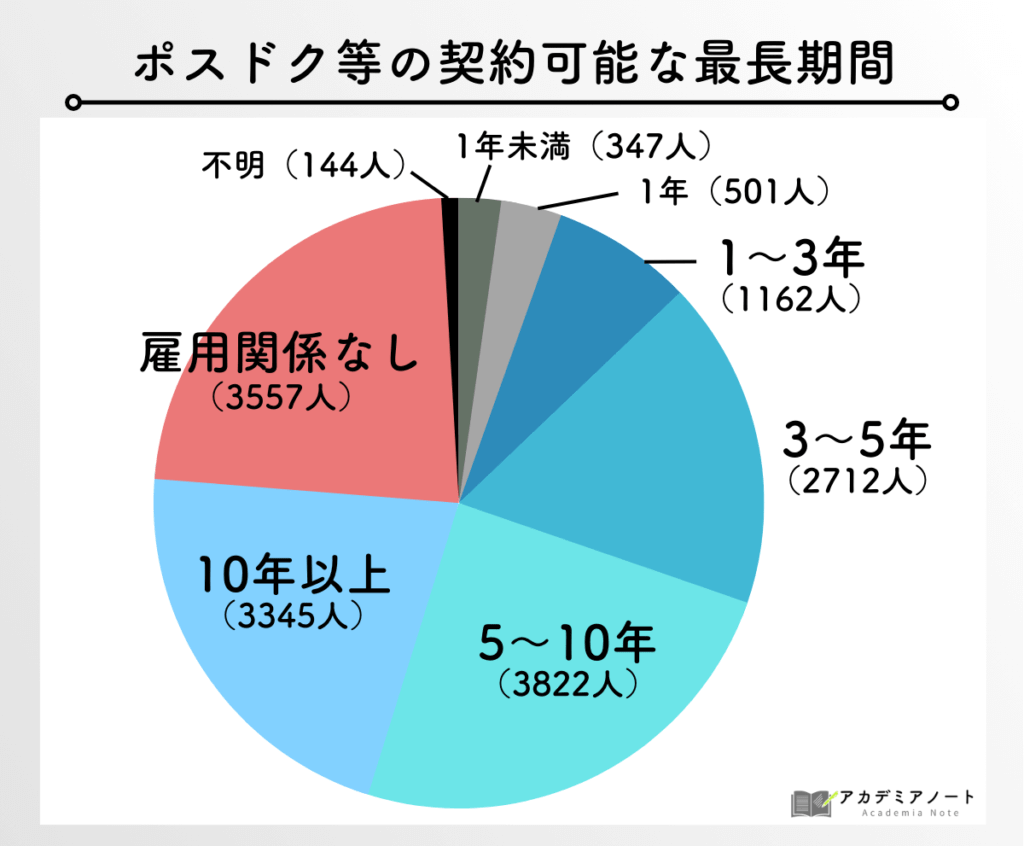

I see!
In this way, nearly half of the postdocs areWork at the same institution for at least 5 yearsI guess so.
 Akanon
AkanonOf course, many researchers would prefer to obtain a formal academic post as soon as possible rather than stay in a post-doctoral position for a long time.
Post-doctoral employment funding
According to the 2018 Fact-Finding Survey, post-doctoral employment funding is distributed as follows
 Akanon
AkanonFinancial resources really vary.
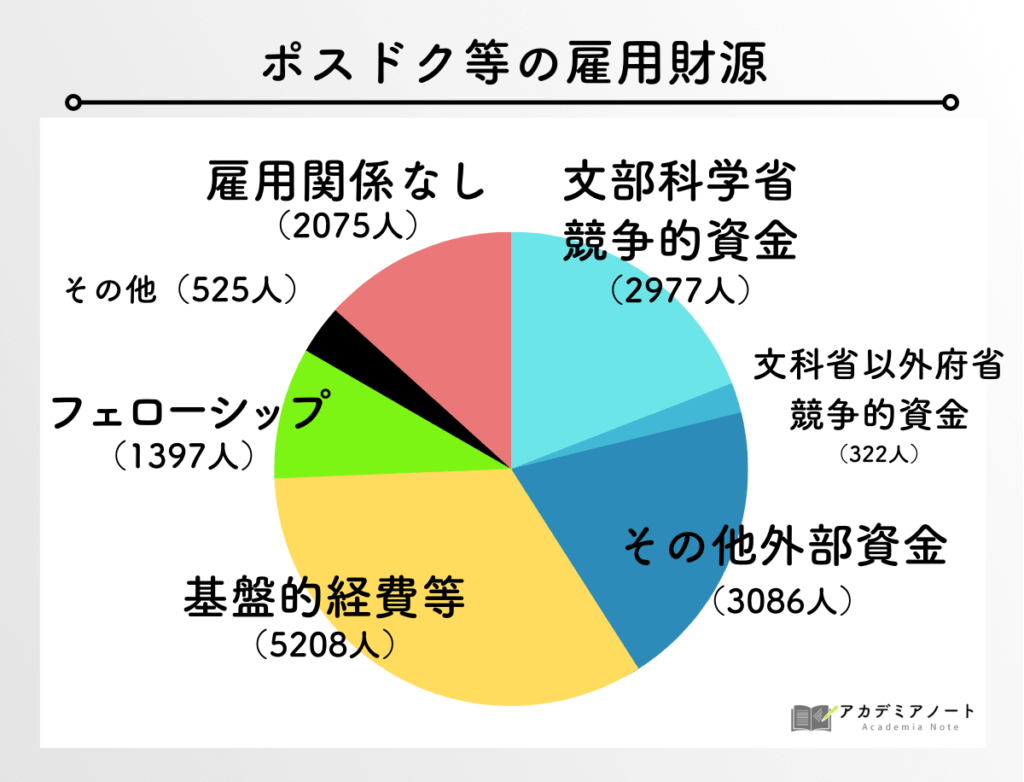
Funds obtained from outside sources by the boss, who is the laboratory principal investigator (PI).
Write an application for an R&D proposal and apply for it → If the evaluation is good, the proposal is adopted → R&D funds are allocated.
A typical example is the Grant-in-Aid for Scientific Research (commonly known as KAKENHI) from the Ministry of Education, Culture, Sports, Science and Technology (MEXT).
This system allows postdoctoral fellows themselves to earn their own salaries externally.
Typical examples are,JSPS Research Fellow PDIt is. The details are described below.To Special Researcher PD
The breakdown of fellowships in the above chart shows that JSPS Postdoctoral Fellowships and JSPS Postdoctoral Fellowships for Foreign Researchers account for about 99% of the total.
Annual income of postdoctoral fellows

| average age | Annual income (ten thousand yen) | |
|---|---|---|
| whole | 33.0 | |
| By Field | ||
| slave labour camp | 33.3 | |
| physics | 33.0 | |
| engineering | 32.3 | |
| agriculture | 32.7 | |
| hygiene | 34.0 | |
| Other | 34.5 | |
The above figure is the result of a survey conducted among postdocs in 2008.(This is old, as no new studies have been issued by the government since then.)
As for salary, there is a big difference between full-time/part-time and other types of employment.
For example, in the humanities, the percentage of part-time positions is high, so the salary as a postdoctoral fellow is also calculated to be low.
 Akanon
AkanonPretty cheap considering the salary of a PhD before 30...
JREC-INYou can check the salary rates by looking at
If you would like to check the salary rates for postdocs in your field of studyJREC-INcan be utilized.
Check "Position: Researcher/Postdoctoral equivalent" and search by keywords such as research field to find employment conditions for each field.
Employment status varies, including annual salary and hourly wage.
Annual salary.250,000-500,000 yen/month
Hourly Rate.1500-2500 yen/hour
 Akanon
AkanonA quick search shows that there seems to be a lot in this salary price range in all areas
Please also refer to this page, which lists salaries for fixed-term post-doctoral researchers and other positions at public research institutes.

Exceptional Postdoctoral Fellow
JSPS Research Fellow PDThere are also systems with a set number of post-doctoral positions available each year, such as open recruitment from the
 Akanon
AkanonBecause of the extremely high degree of freedom in research activities, the application rate is high, and only the best candidates can pass through the narrow gate.
Research Fellow of the Japan Society for the Promotion of SciencePD
A system to provide living and research expenses to outstanding young researchers (support organization:Japan Society for the Promotion of Science)
There are three types of postdoctoral fellowships available
- PD
- RPD(For researchers who have interrupted their research due to childbirth, childcare, etc.)
- Researchers employed in PD can apply forCPD(Research Fellow for International Competitiveness)
The following is a brief introduction to the system, focusing on the special researcher PD.
<For Postdoctoral Fellow PD
- Applicants must be within 5 years of completing the doctoral program.
- The number of recruits is approximately350 personsand very few
- Employment period is 3 years
- Living expenses:362,000 yen/month
- Research Funds:Up to 1.5 million yen/year
Although the special researcher has not previously had an employment relationship with the host institution,2023Special Researcher PD, RPD, and CPD fromCan be employed by the host institutionand thus improved the coverage of employee pension and unemployment insurance.
| conventional | R5 fiscal year onwards | |
|---|---|---|
| social status | Research Fellow of the Japan Society for the Promotion of Science (No employment relationship) | Staff of the host institution |
| Salaries, etc. | JSPS provides the grant as a "Research Fellowship". | 「salaryPaid by the host research institute as |
| Various allowances, etc. | nashi (Pyrus pyrifolia, esp. var. culta) | Commuting allowance, overtime allowance, etc. are provided. |
| public pension | national pension (Category 1 insured person) | welfare pension (Category 2 insured person) |
| health insurance | national health insurance | Health insurance by health insurance association, mutual aid association, etc. |
| unemployment insurance | nashi (Pyrus pyrifolia, esp. var. culta) | Applicable |
| Workers' Accident Compensation Insurance, etc. | Personal Accident Insurance (JSPS pays all expenses) | Applicable (The host institution pays all expenses.) |
| income tax | JSPS withholding tax | Withholding tax by the host institution |
| municipal tax | Payment by each person | Deducted from salary |
Post-doctoral positions open annually from the Institute
There are also post-doctoral positions that are regularly advertised by the institute.
 Akanon
AkanonI'll give you an example of a famous RIKEN Postdoctoral Fellow.
RIKENPostdoctoral Fellowship for Basic SciencesExamples of
| treatment | 550,000 yen/month on an annual salary basis (including social insurance premiums) Commuting allowance (up to 55,000 yen/month) Housing allowance (part of rent) Travel expenses for postings (based on the Institute's regulations) |
| term of office | 3 years |
This is a very high salary for a post-doctoral fellow.
 Akanon
AkanonIn addition, social insurance and eligibility to apply for external funds such as Grant-in-Aid for Scientific Research are available.
Postdoctoral Issues
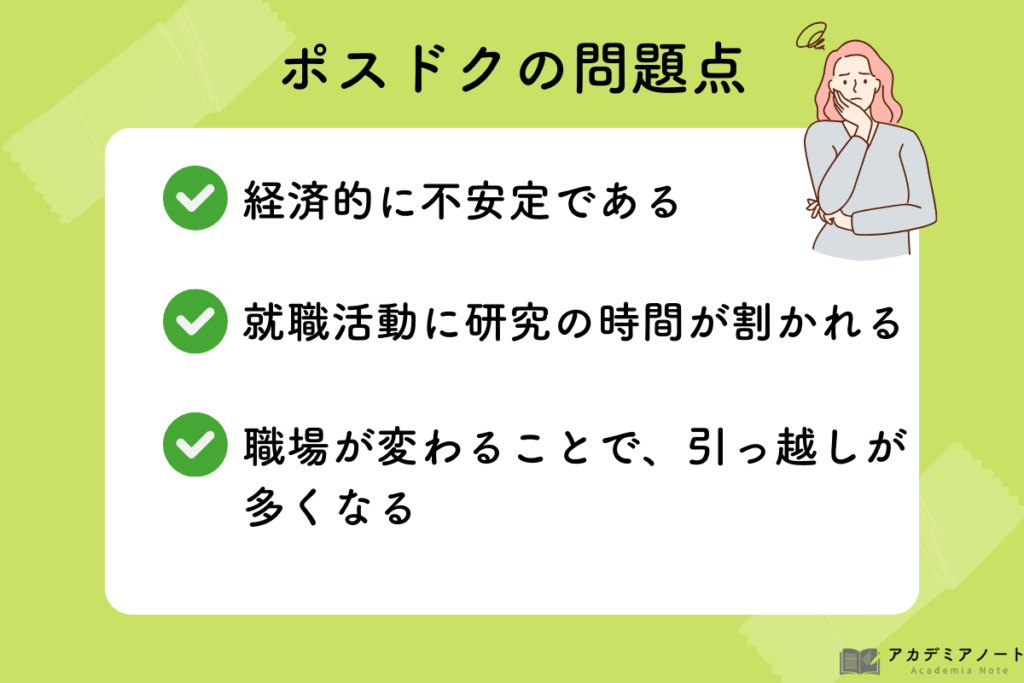
Problem #1: Economic instability.

The current salary is too low, and there are no bonuses.
Postdocs are thinly paid, and in many cases there are no bonuses or other benefits.
In this context, there is also the problem of the low percentage of postdocs who are covered by Social Security.
In the 2018 survey, the number of postdocs with social insurance was as low as 65.9%.
Problem #2: You have to look for your next job in parallel with your research.

I haven't decided what my next position will be after my term is up...
Postdoctoral fellows may become unemployed if they do not find a new post by the end of their term.
Even though it is a time when you want to focus on research and accomplishments, you must also simultaneously search for a job in order to obtain the next post.
This inability to conduct sufficient research activities has also been cited as a problem.
Problem #3: Changing workplaces will cause a lot of moving around.

I just got my next job, so I have to move again...
Researcher jobs are available throughout the country.
A change of residence after a short term can be financially and emotionally taxing.
The problem becomes even more complicated when you have a family, especially if you live alone, your spouse is employed, or your children move to a different school or school.
Advantages of becoming a postdoctoral fellow
At first glance, postdoctoral positions may appear to have significant disadvantages, but the advantages outweigh the disadvantages.
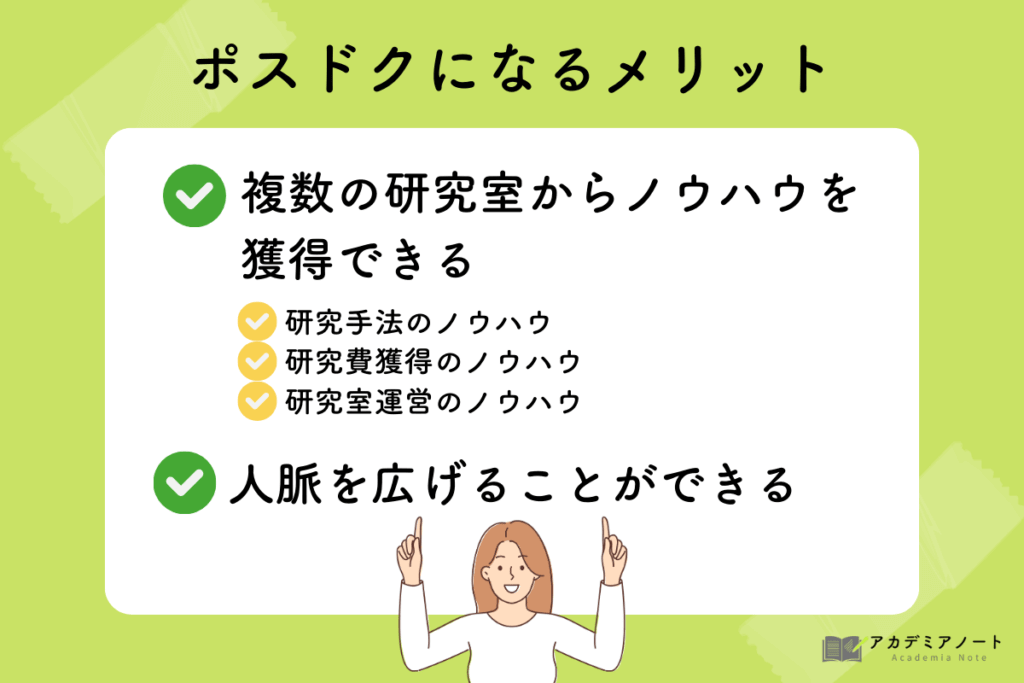
Advantage 1: Acquire know-how from multiple laboratories
Laboratories are very closed.
It is not uncommon to find that, externally, the same research is being conducted, but the research methods are completely different.
In other words, the reality of the lab isYou never know until you belong."It is all about the
By experiencing multiple laboratories as a young postdoctoral fellow, you can acquire the following know-how
This is one of the greatest advantages of postdoctoral positions.
- Research Methodology Know-How
- Know-how to obtain research funding
- Expertise in laboratory management
Research Methodology Know-How

When you are about to start some new experimental system, you may not be able to reproduce it by trying the research methods described in the paper.
Also, the same experiment can be very efficient in some laboratories, and there are tricks for producing data successfully.
In other words, the actual research methodology,You have to actually see and experience it to understand it.In most cases.
 Akanon
AkanonSome laboratories are stuck in the old ways of thinking and have piles of useless work. You should see a lot of the outside world so that you don't become a frog in a well!
Know-how to obtain research funding

Perhaps the greatest benefit is the know-how gained in obtaining research funding.
There is a default in writing applications for competitive funds such as Grants-in-Aid for Scientific Research that has been handed down in that laboratory.
When young people are writing applications, many PIs will often show them their own past applications, saying, "Use this as a reference.
 Akanon
AkanonI have been.
From there, you will learn about the overall structure and wording, make your own final product, and have it corrected by the PI.
 Akanon
AkanonI see! I see! I can write like this! It's a series of "I see" and "I should write like this!
In addition, each laboratory has a list of foundations and other organizations that can easily obtain research funding.
In order to acquire the know-how to obtain this research funding, postdoctoral fellows have an excellent opportunity to do so.
Expertise in laboratory management

The know-how to run a laboratory is always a good thing to learn if you want to become a PI in the future.
Smooth laboratory operations are directly related to securing quality human resources, research environment, and research performance.
- How to use research funds
- Student guidance (papers, conference presentations, etc.)
- The nature of the student guidance system (e.g., support system for senior students)
- How meetings and progress meetings should be
- Assignment of miscellaneous duties
- How to communicate and coordinate schedules among members
- How to interact with other laboratories
It is also the role of the PI to determine the direction of all these activities.

Being a PI is hard.
The best style for each laboratory will depend on its size and content.
 Akanon
AkanonPlease experience various laboratories and accumulate know-how!
Advantage 2: Expand your network of contacts.
Networking is incredibly important for a researcher's career.
- Post Acquisition
- collaborative research
- Knowledge and information sharing, etc.
Researchers may seem to work in solitude, but it is also a world where personal connections run deep.
By belonging to many laboratories as a postdoctoral fellow, you will be able to make a wider network of contacts.
By building up a solid post-doctoral period, this network of contacts will live on for the next 10 to 20 years.
 Akanon
AkanonIt's quite possible that in the distant future you'll be helped by a PI from your post-doctoral days.
Researchers need to decide whether to remain in academia or become corporate researchers

Considering the post-doctoral problem, it seems difficult to get a doctorate and remain in academia.
If you have any of these concerns, please continue reading below.
In living as a researcher,Deciding whether to pursue academia or become a corporate researcherThe following is a list of the most important factors that must be considered.
Researchers work in three main types of environments.

| Number of researchers in the country*. | feature | |
|---|---|---|
| University (Academia) | 336,800 people | Both Research and Education |
| public research institution | 38,200 people | Focus on research |
| business | 515,500 | Focus on research (Mainly activities with an eye to monetization through research and development) |
 Akanon
AkanonDecisions based on aptitude and life plansPlease do.
There are many differences between academia and corporate researchers, which are summarized in detail in this article>>>

summary
In this issue, we summarized STEP 1: "Characteristics, working style, tenure, annual income, problems, and advantages of becoming a postdoctoral fellow" as an overview of postdoctoral positions.
Please take a look at the articles after STEP 2 if you like.
 Akanon
AkanonThank you for reading to the end.
Article updates are also posted on X and Instagram.
Please follow us and check it out!
- click here
- Click here for the installation.
- Click here for YouTube (in preparation)
- Click here for NOTE

request
Thank you for taking the time to read this article.
This is a personal site that the operator updates little by little in between his personal life.
If you found the content of this site helpful,
We would be happy to receive feedback on social networking sites.
The feedback we receive will encourage us to create future articles.

